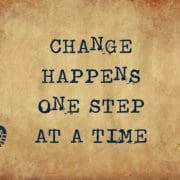Why changing your habits is so difficult to do
In the picturesque tranquillity of Byron Shire, where change seems as effortless as the tides, the personal transformation within individuals can often feel like an insurmountable challenge. At Anne Evans Counselling, understanding the complexity of human behaviour is central to facilitating growth and change. Changing entrenched habits is a journey that many find daunting. This article delves into the reasons why altering our habits is such a difficult endeavour and how counseling can support this transformative process.
The Nature of Habits
Habits, by definition, are routines of behaviour that are repeated regularly and tend to occur subconsciously. They form the tapestry of our daily lives, providing a structure that reduces the need for constant decision-making. However, when these habits become detrimental to our wellbeing, the need for change becomes evident.
The Comfort of the Known
Our brains are wired to seek out comfort and familiarity. Habits, even those that are harmful to us, can provide a sense of security because they are known entities in our otherwise unpredictable lives. Breaking these patterns means venturing into uncharted territory, a prospect that can be intimidating and unsettling.
The Reward System
Many habits have a reward component that reinforces the behaviour. Whether it’s the dopamine rush from a sugar hit or the brief stress relief from smoking, these rewards make the habits highly addictive and difficult to break. The immediate gratification often outweighs the long-term benefits that come with healthier choices, making change less appealing.
Psychological Barriers to Change
Fear of Failure
Many individuals fear that they will not be able to sustain new habits and thus avoid attempting to make a change altogether. This fear of failure can be paralysing and is often rooted in past experiences or low self-esteem.
Identity and Self-Concept
Habits can become a part of one’s identity. A person might think of themselves as a “smoker” or a “night owl.” Changing these habits means altering how they perceive themselves, which can be a significant psychological hurdle.
Cognitive Dissonance
When there’s a conflict between our beliefs and our behaviours, we experience cognitive dissonance. For example, someone might believe that healthy eating is important but can’t stop eating junk food. This dissonance creates mental discomfort, which people often resolve by reverting to old habits.
Social and Environmental Factors
Social Pressure
Humans are inherently social creatures, and our behaviours are often influenced by those around us. If unhealthy habits are part of social rituals, it can be difficult to break away from them without feeling isolated or ostracised.
Environment
Our environment is full of cues that can trigger old habits, from the sight of a candy bar at the checkout to the smell of fast food as we pass by a restaurant. These environmental triggers can cause automatic responses that are hard to resist.
The Role of Counseling in Changing Habits
At Anne Evans Counselling, the approach to habit change is comprehensive, addressing the psychological, emotional, and practical aspects of altering entrenched behaviours.
Understanding the “Why”
Counselling helps to uncover the underlying reasons for habits, which is crucial for meaningful change. Understanding why we engage in certain behaviours can inform the strategies we use to alter them.
Developing Self-Compassion
Counseling fosters self-compassion, allowing individuals to accept past failures and understand that change is a process that often involves setbacks. This mindset can reduce the fear of failure that hinders many from attempting change.
Building Resilience
Through counseling, individuals can build resilience, equipping them with the psychological tools to persist in the face of challenges and setbacks. Resilience is crucial for navigating the ups and downs of changing long-standing habits.
Tailored Strategies
Anne Evans Counselling assists individuals in developing tailored strategies that consider their unique life circumstances, preferences, and goals. Customised plans increase the likelihood of sustainable change.
Supportive Accountability
Counseling provides an accountability framework that supports habit change. Regular check-ins and the supportive presence of a counselor can keep individuals focused on their goals.
Embracing the Complexity of Change
Changing habits is a complex process influenced by a myriad of factors, from neurobiology to social environment. At Anne Evans Counselling in Byron Shire, the challenge of altering detrimental habits is met with a compassionate, holistic approach that recognises the individual’s journey. By creating a supportive space to explore and understand one’s habits, individuals are empowered to initiate and sustain the meaningful change they wish to see in their lives.



